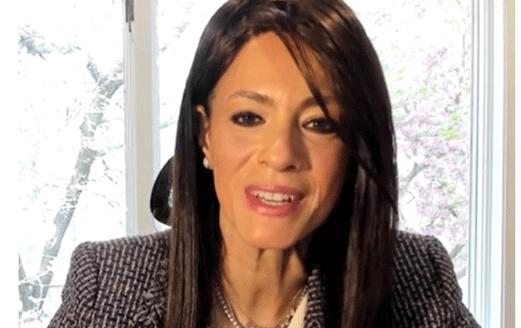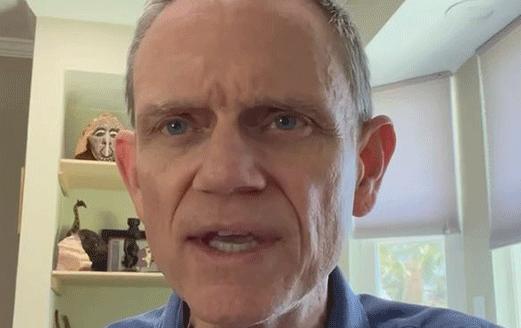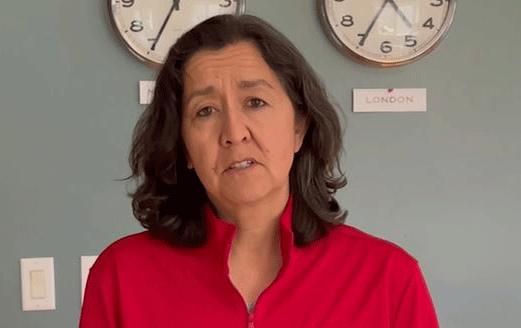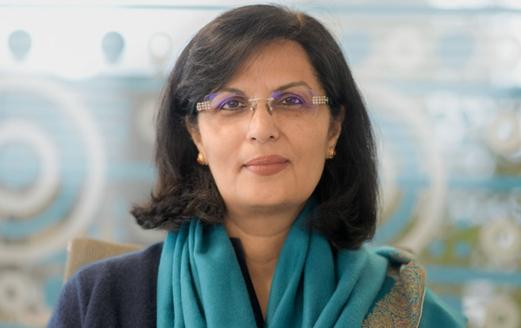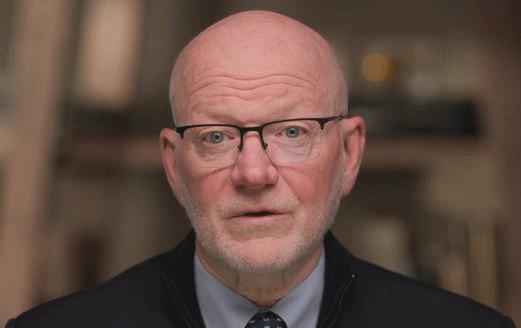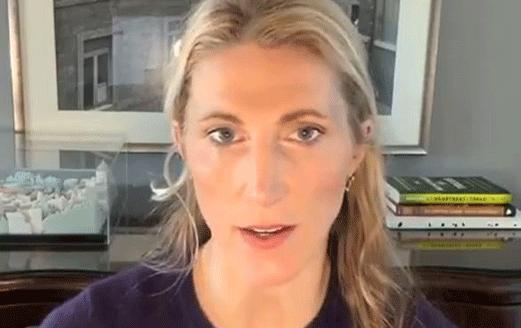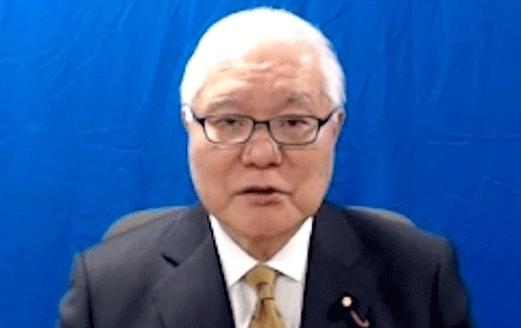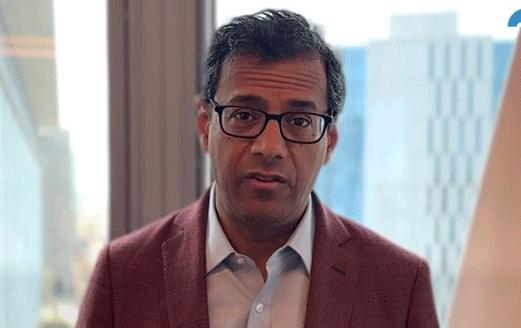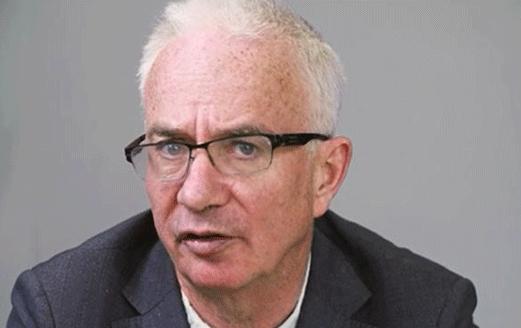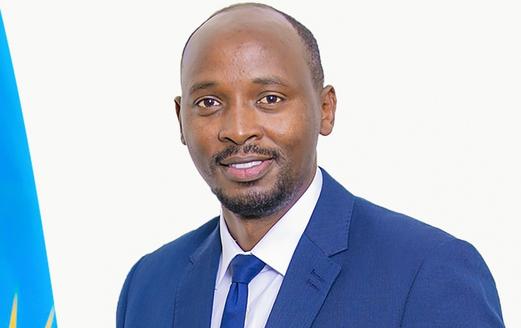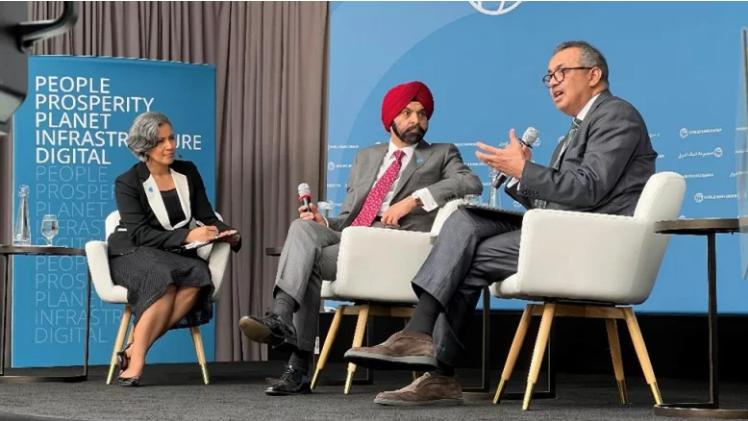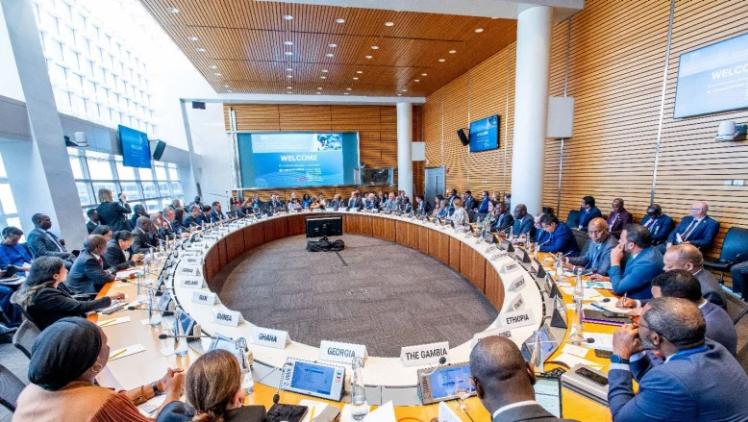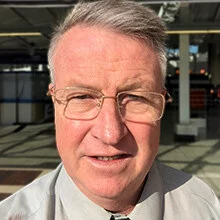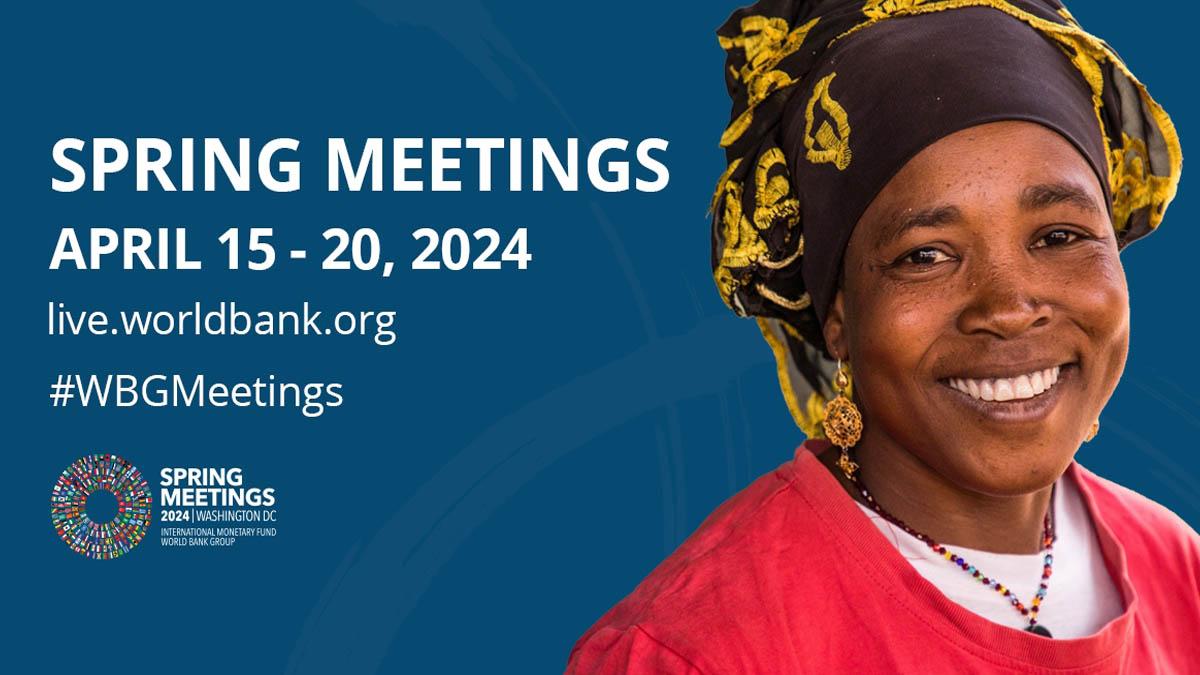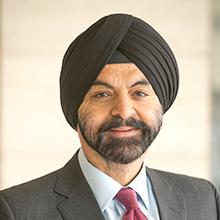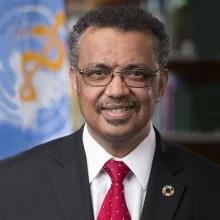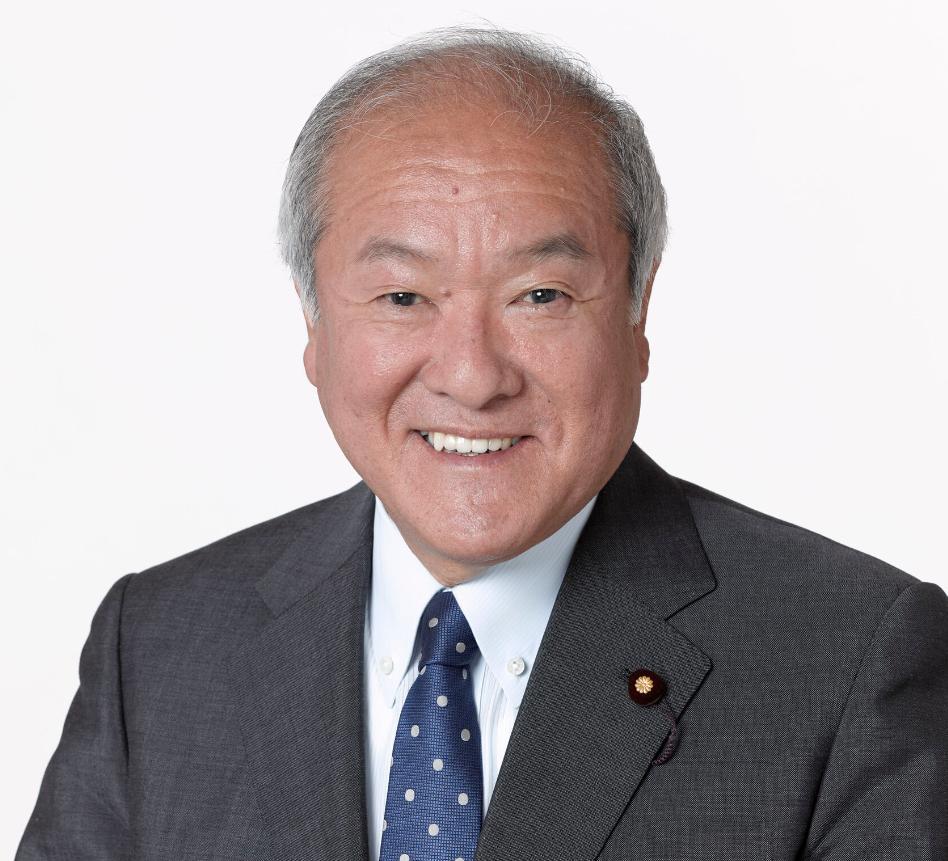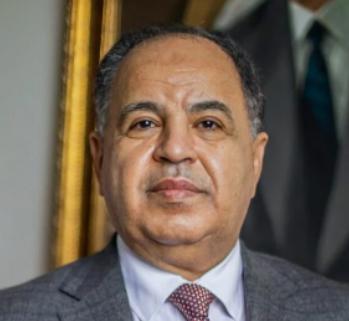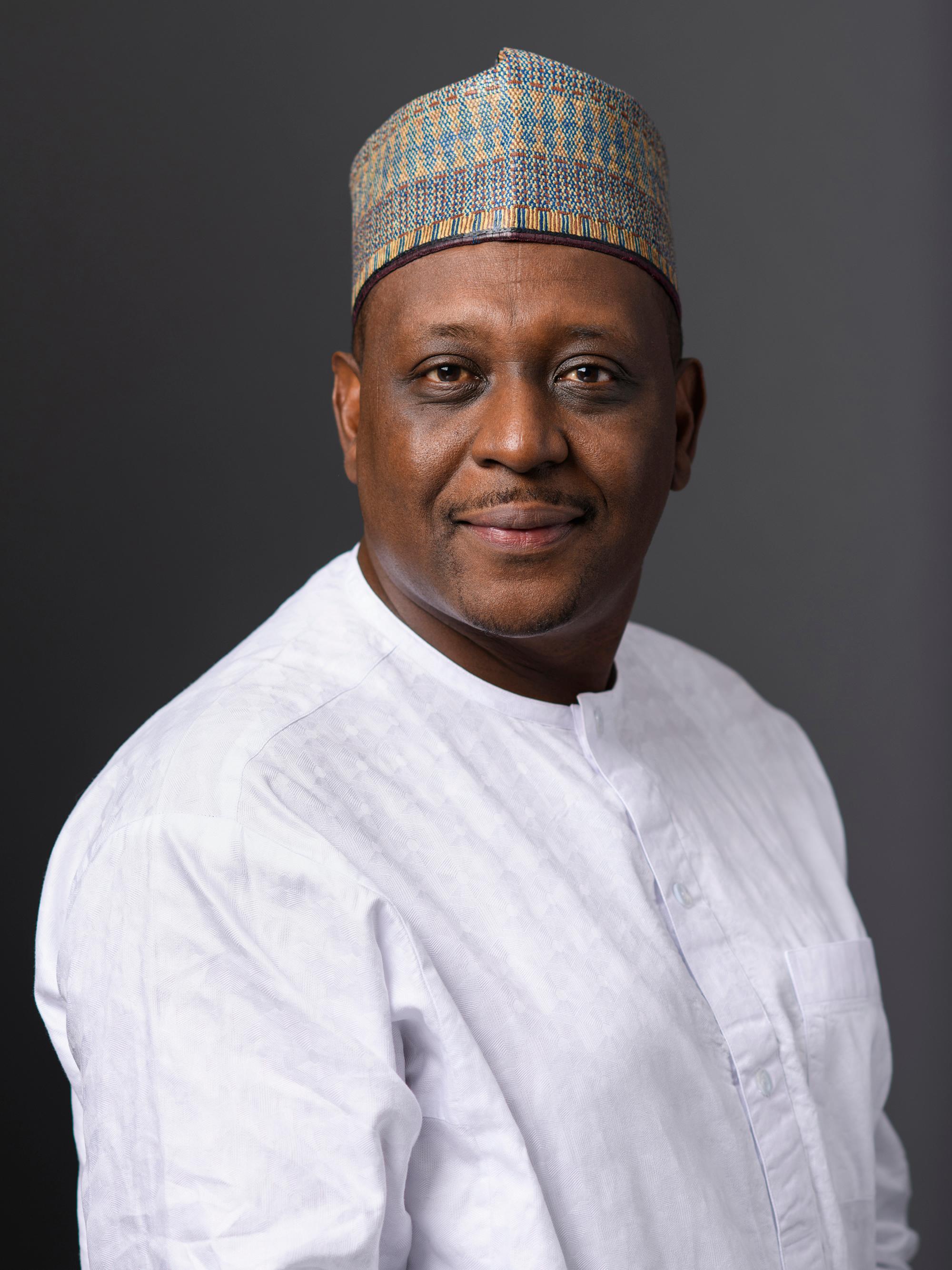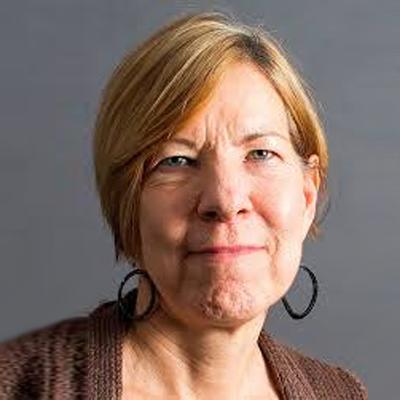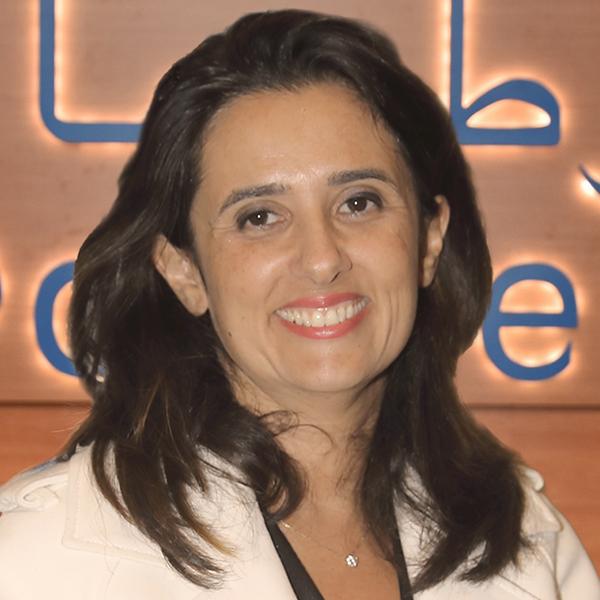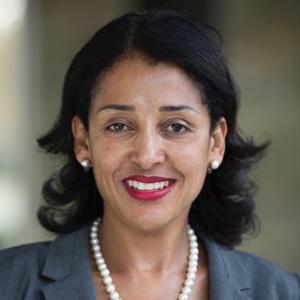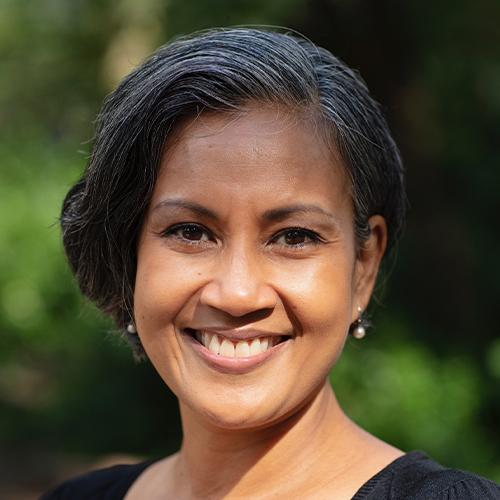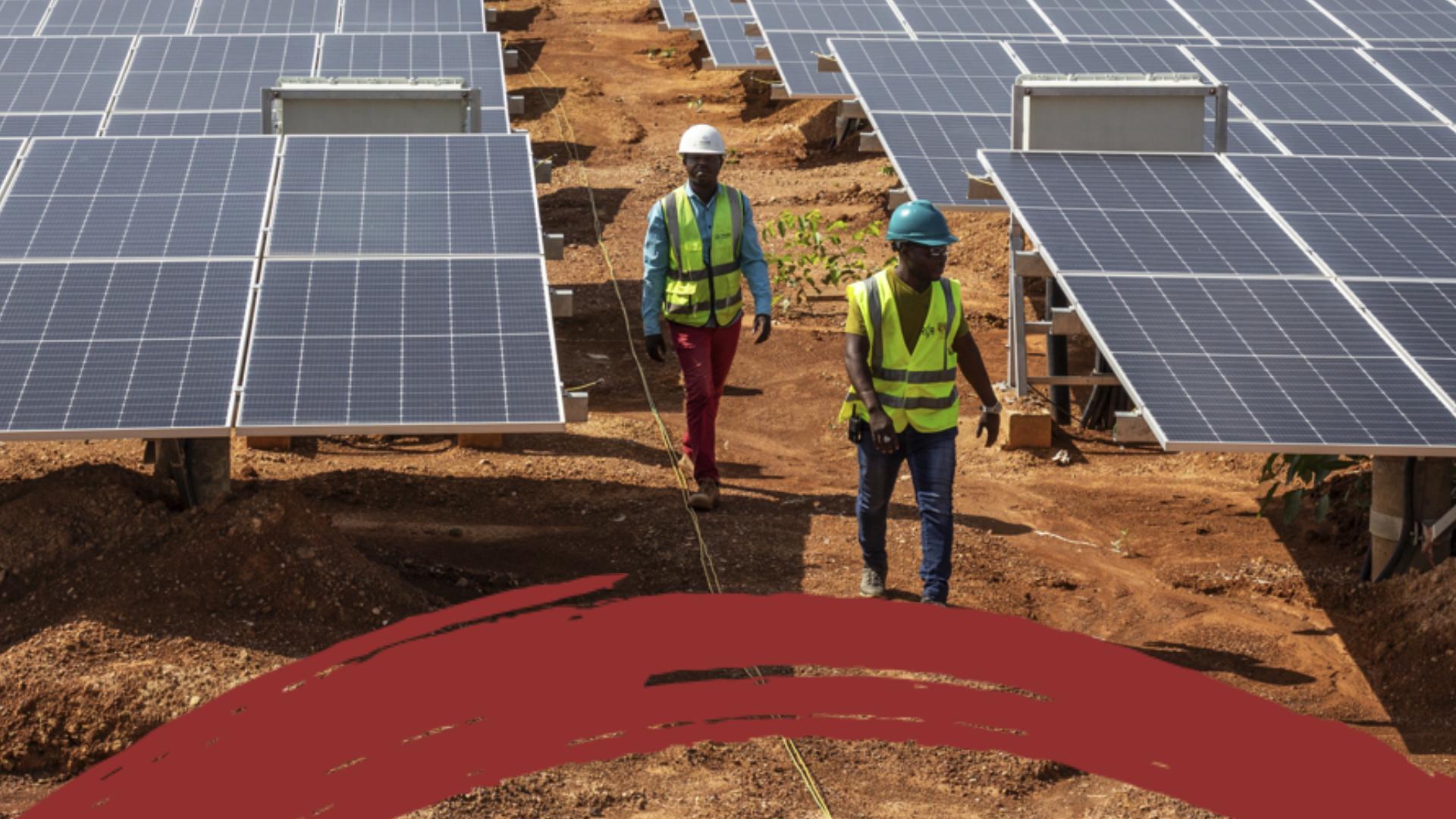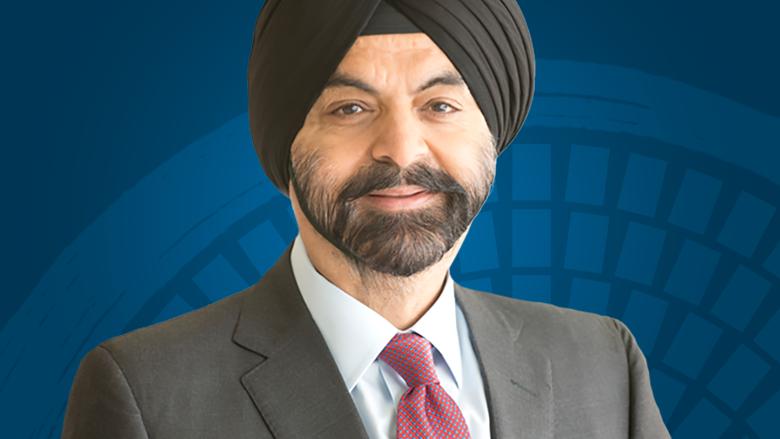[Shakuntala Santhiran]
Hello and welcome to the 2024 Spring Meetings of the World Bank Group and IMF. We have a full room here. I'm Shakuntala Santhiran, Shaks for short. Over the next hour, we'll discuss how countries can accelerate progress toward universal health coverage, where everyone, everywhere has access to quality, affordable health care when they need it. You can share your thoughts on this topic at any time using the hashtag #WBGMeetings. We have experts in multiple languages standing by to answer your questions online at live.worldbank.org. Please, post your questions in the live chat if you're joining us online, or by using the QR codes displayed on the chairs in front of you and around the room if you're here with us. Now, later in the program, we'll hear from ministers of Health and Finance, leaders in the private sector, civil society, and philanthropy to explore the issues and opportunities. First up, let's get the perspective of two people very familiar with the topic who understand what we need to make urgent progress. Please, join me in welcoming Ajay Banga, President of the World Bank Group, and Dr. Tedros Adhanom Ghebreyesus, who's Director General of the World Health Organization. [Audience applauds]
[Shakuntala Santhiran]
Greetings, gentlemen. Thank you so very much for being here with us today. Ajay, first, quickly, you've been doing a lot of work fixing the plumbing of the World Bank Group. Why and what's the aim of that?
[Ajay Banga]
This plumbing question is getting asked a few times, and I think that's because I made the statement that I believe that if you make the Bank better and more effective, quicker, faster, simpler to navigate, then that allows you to raise your ambition on the kind of things that you can do because your ability to execute gets enhanced many times over by the quality of your foundation. So, I use plumbing to describe it because I say that you can't build a new house with poor plumbing. That is the logic. What we're trying to do is to improve the speed, turnaround time. It used to take us 19 months to get a project approved from the time we started talking about it to approval, we're down by three months. We want to bring down another three months by the middle of next year. If we get it down to a year, that's really good, given the complexity of what we deal with. We're trying to do things with combining our structure in different countries, 20 countries. We're going to put one country ahead on top of IFC, MIGA, IBRD all together. So, our client has to deal with one person, one World Bank Group, and cut out some of the silos that otherwise are visible. We're working on capital adequacy, change the Vision and Mission of the Bank to include Livable Planet. There's a whole series of these partnerships with the multilateral banks. We're about to launch a co-financing platform, a digital one, which will enable all the MDBs to work together on co-financing deals. We're looking at standardizing standards across procurement. I mean, I could keep going. It's all the plumbing. It's what makes the bank and its people work quicker, faster, better.
[Shakuntala Santhiran]
So, streamlining everything.
[Ajay Banga]
Right.
[Shakuntala Santhiran]
Here we are today talking about health with the world facing so many pressing issues. Why are we talking about health care today?
[Ajay Banga]
Because I think health care is foundational. I think that at the end of the day, if you look at people struggling with either the cost of health care or the inability to access health care, it leads to the worst possible outcomes. I went to Indonesia and saw the work they're doing on stunting. The reality is that a child in the first 1,000 days of their existence doesn't get the right kind of nutrition, that has an impact economically forever for that child. They earn between 15% and 20% less every year, forever. If you look at climate change and what it's doing to heat impact on diseases, another issue. Tedros can talk about this ad nauseam, but 2 billion people in this world do not have access to health care in a way that they get insurance or they get it free. They end up paying for it out of pocket. That puts them in a cycle of poverty for a long time to come. We've got to fix what is a fundamental requirement for human existence in the form of health care, and we have to make it available at a price that's affordable. That's not that complex to get around your head. It's hard to get done, but you will hear from the Japanese Finance Minister in a short while, they knew how to do it well. And that's what we are trying to do as well.
[Shakuntala Santhiran]
So, “no health, no wealth,” as the saying goes. Thank you for spelling that out for us, Ajay. So, Dr. Tedros, where does the world stand on universal health coverage that you've long championed?
[Dr. Tedros Adhanom Ghebreyesus]
Now, thank you. First of all, I would like to thank my friend Ajay for inviting me to this very important session. And second, I fully agree with him, health is the foundation. As you rightly said, “health is wealth.” That's why Ajay and the World Bank takes it seriously. And we're very, very glad to say this. By the way, our partnership is increasing from time to time now. We partner on UHC, we partner on Global Preparedness and Monitoring Board, we partner on Pandemic Fund, we partner on also leading the Health and Finance Task Force, you name it. It's a long list, by the way. So, thank you so much for your leadership, Ajay. And on the status of UHC, 140 countries have recognized health as a fundamental right in their constitutions. This is very important because it's recognizing health as a fundamental human right, which is a political choice that can help us to do the rest, financing or everything. So, that's good. Then the second part is, since the birth of WHO, that's 76 years ago, life expectancy has increased from 46 to now 74, average. This is good progress. Of course, this is living condition improved, improvements in medicine, improvements in public health. It's overall development. It shows overall development. We're progressing, but if you see the SDG goals directly, if you compare it with the SDG goals, we're off track.
[Shakuntala Santhiran]
Yeah, very.
[Dr. Tedros Adhanom Ghebreyesus]
I don't think without a very serious catch-up, we may even reach the SDGs. So, we have to work harder, and that's why we're partnering with the World Bank and other partners, the whole UN, with countries, especially countries at the center, to push forward to achieve the SDG goals.
[Shakuntala Santhiran]
So, partnerships, clearly, key, Dr. Tedros, just talk us through quickly. What are some of the key challenges to achieving universal health coverage?
[Dr. Tedros Adhanom Ghebreyesus]
So, the challenges are twofold. One, in terms of service coverage, and second, financial. I think Ajay had already said that. In terms of service coverage, 4.5 million do not have access to basic services, and 2 billion, Ajay said it, face financial hardship, trying to seek service. And even as a result, some of them descend into poverty. So, that's one of the challenges. Coverage, the first one, the 4.5, but also, the financial hardship, which is the 2 billion who can’t afford. These are the two main ones. But of course, there are problems like shortage of the workforce that we need to address. There is, of course, a long list of challenges.
[Shakuntala Santhiran]
And overall aging population as well.
[Dr. Tedros Adhanom Ghebreyesus]
Aging population, urbanization, and now with the pandemics, climate and health because the climate crisis is a health crisis. So, the major trends and problems actually that complicate the health problem.
[Shakuntala Santhiran]
So, those are some very stark figures and daunting challenges. So, Ajay, in the face of this, what is the World Bank Group doing to support countries to get health care to more people?
[Ajay Banga]
By the way, one thing I understand. One thing I would like to say, the issue of, for example, workforce shortages is also an opportunity because if you think about Africa, and Tedros is an Ethiopian, and if you think about the whole continent, the number of young people who are going to be looking for jobs in the coming 10 to 15 years, one of the ways to give them a really good job is give them the chance to get skilled to provide the kind of service that's going to be required from the investment we're going to make in the coming 10 years in this space. He's absolutely correct. It is a problem today, but we also see it, both of us, as a way forward for young people. Back to your point, what are we going to do? The Bank has been working in 100 countries for a while on what I would call “maternal and neonatal” kind of effort to improve the delivery of care to women and young babies, and they've done a decent job of doing so. The question really is if you want to widen your aperture to include the diseases across adolescents and older age. So, if you just think about heart attacks, diabetes, blood pressure, those are diseases that are challenging, in older life as well. So, if you want to broaden the access for those, then you have to widen your aperture to include that. And that's what we are trying to do in this effort, reach 1.5 billion people over the coming period with the WHO, with other partners, and make that happen by 2030. Reach them means really reach them. I don't mean reach as in you put up a center and everybody in the area is counted. This is actually touching the person with a medical appointment, either physical or telehealth, working on this expanded range of noncommunicable diseases, and maybe in those 100 countries, but maybe expanded geographies in those countries or new countries as well. That's the effort we're going to try and put in by now in 2030.
[Shakuntala Santhiran]
That's one and a half billion people in essentially five years. How are you going to do that? [Ajay Banga] Six years, but who's counting? [Panelists laugh]
[Ajay Banga]
Six years. How are we going to do that? [Shakuntala Santhiran] How are you going to do that?
[Ajay Banga]
How are we going to do that? I think it takes a lot of hard work, a lot of knowledge, a lot of financing, and a lot of partnerships. Let me quickly walk through a little bit of it. Financing is the obvious one. We've got money, yes. We're a money bank and a knowledge bank, but even the money we can put to work will never be enough. We're talking about putting to work 50% more money per year than what we used to spend in healthcare pre the pandemic. You're still going to need money from governments. You're going to need money from the private sector. Let me walk you through this a little bit. If you talk about the countries that are at the lowest end of affordability, mostly IDA countries, they spend relatively little amounts of money per person, 21 dollars per person per year on health care. That's not going to get you health care workers in remote areas that we're talking about. We have to give them share financing, concessional and grant financing. But if you're a middle-income country, you may have more money available, but you may not have the right regulatory policies to create the multiplier that you want to create by also bringing in the private sector, but also clarifying how to get more energy going into this space. I think there we can help with incentivizing them through our money to create the right regulatory platforms, the right policies. Tedros can talk to you about regulatory policies all day long, but that could help a lot. If you get the private sector involved, once they have some clarity, you could do things like focusing them on the manufacturing of PPE, manufacturing of essential medicines, something that Tedros had a nightmare of during COVID. Ask him, he will tell you. If you could also get them involved with, for example, putting the right vitamin supplements into processed foods so that you enhance health right from the basic consumption. So, there's a number of things. Some of these are more likely to happen in some countries, some in others. The point is this financing has to be catered for the country and its stage of development. In the same way, knowledge has to be catered for the country and its stage of development. If it's basic knowledge, are you talking about putting our primary health center or a hospital, which is better at what stage of development? Tough choice, but a conversation to be had. If it's later discussions and conversations about, does this country need geographic expansion? Does this country need new skills? Does this country need affordability? What's the logic of what that country needs to break through its barriers on delivering its share of the 1.5 billion? That's kind of the knowledge part. The partnership part, there are a lot of people in the audience. I'm sure Gavi is here and others are here. They're all part of this game. You kind of need to bring all shoulders to the wheel. But since we've got Tedros here, he has what I would call “domain expertise” beyond limit, technical expertise beyond limit. What do we bring? We bring a diversification of knowledge. We understand water, we understand climate, we understand agriculture, we understand different things. We understand how those connect to health challenges. We can bring that knowledge as a partner, not just our financing, not just our ability to advise governments on regulatory policy, but our ability to help even him understand the intersections between these different causes of health care problems in the intertwined challenges that we are going through. So, it's a long answer. It needs a lot of work. It's going to be really hard work between now and 2030. I'm sure we will make mistakes along the way, but we are determined to get this done.
[Shakuntala Santhiran]
You certainly got your work cut out for you, right? So, partnerships, financing, and the sharing of knowledge, all vital. Dr. Tedros, what do you hope to see in global health in five years? Or six years?
[Dr. Tedros Adhanom Ghebreyesus] [Laughs]
In six years.
[Shakuntala Santhiran laughs]
[Dr. Tedros Adhanom Ghebreyesus]
By the way, the two things which are very important with regards to making progress are, one, a political commitment. I can add to that. Of course, financial commitment also, you had said that. Political commitment, we have 140 countries who recognize health as a human right, and we have 140 countries who recognize health as a fundamental human right, and we hope the other countries will do, because health is a political choice. When they do that, then the rest comes, including finance. Then, the second is the financial commitment. In the financial commitment, there is a way. There are finance ministers here, and we expect you to increase public spending. Commitment to Universal Health Coverage or Health For All, of course, it's ambitious, but it's possible. One example that comes to mind is the United Kingdom. After the Second World War, when its economy was in its knees, it actually declared Universal Health Coverage. The Lord Beveridge model started immediately after the Second World War. So, economic status cannot be an issue. You can start with what you have. The key is the commitment, and then you can build up. So, I think the political commitment and finance are important. Then what do I expect in the next? Of course, I said earlier, to get better or to add years into your life, life expectancy, then we need, especially to focus on mothers and children, to reduce mortality. It can be done. By the way, Ajay raised that when I was Minister of Health in Ethiopia, just in a few years, with the introduction of primary health care, that maternal and under-five mortality started to decline significantly. That's what I wish in the next five, six years. Still, there could be a significant cut in many of the countries, especially who have high burden of maternal and child health. This could be done through a combination of promoting health, especially addressing the root causes of ill health, focusing on the determinants, because many of the health problems are in the food we eat, in the air we breathe, in the environment we live in, our lifestyle, and so on. We should start from there. The second is the access issue we said, Universal Health Coverage, but with primary health care at the foundation, because primary health care is key to cover the basic services. More than 80%, by the way, can be covered using primary health care. Primary health care is also the ears and eye of the health system, and it can help us to prevent outbreaks, but at the same time, if not to detect early and manage. So, investment in primary health care is key. From my own experience in Ethiopia, World Bank was a major player in building the primary health care, which made a good impact. Of course, the pandemic preparedness is very important, and we're investing in that. Then, investment in science, data, and technology is very important. And, like the World Bank, reforming WHO itself to be fit for purpose will be very important. But all this, the center is the country. What do we do at the country level and what capacity do we build at the country level and how do we help countries to achieve is crucial. At the end of the day, the ownership is the countries. We are only here to help. The World Bank and WHO, that's exactly what we're saying. The results come at the country level, I cannot say we'll get this result, but sure, if we can partner effectively and if countries can commit on and take it as a political choice, and if we can support them to the fullest we can, we can turn the tide and hopefully we can achieve SDGs, because that's what we aim for, and we don't need to have another goal. Let's stick to that and make it happen. I'm hopeful that we can do that.
[Shakuntala Santhiran]
A resounding call to action. Dr. Tedros, Ajay, thank you very much indeed for highlighting not only the challenges that we're facing, [Audience applauds]
[Shakuntala Santhiran]
but also, the enormous opportunity that we can realize if people have access to quality affordable health care. It's not just the individual, but also, communities and entire countries who will benefit from such investments. Thank you both again. Now, Japan is a leader in the pursuit of Universal Health Coverage and understands the level of partnership and collaboration it will take to make progress. We are honored to be joined now by His Excellency, Shun’ichi Suzuki. [Speaking in foreign language] This is Japan's Minister of Finance. [Audience applauds] [Speaking in foreign language]
[Shakuntala Santhiran]
Thank you, sir. Thank you.
[Shun’ichi Suzuki]
First of all, I would like to thank President Banga and Director General Tedros for a very insightful discussion. It is my great honor to make a short statement on Japan's efforts to promote UHC. Japan has long been emphasizing the critical importance of UHC as a foundation for human capital development and sustainable growth. Japan has also been advocating that finance-health collaboration is essential to achieve UHC. For this reason, Japan hosted the first G20 joint Finance-Health Ministers’ Meeting in 2019 at the emergence of the G20, Osaka summit. In this context, I am pleased today to see various stakeholders, including finance and health experts meeting to discuss UHC. Japan has been closely working with the World Bank and WHO in supporting developing countries towards the achievement of UHC, including through financial contributions to technical assistance in this area. In order to further accelerate our efforts, I am delighted to announce today that Japan, together with the Bank and the WHO, will establish a UHC knowledge hub in Japan in 2025. [Audience applauds]
[Shun’ichi Suzuki]
The hub will support knowledge sharing on UHC as well as capacity building for finance and health authorities. It leverages the expertise of the Bank and the WHO while drawing on Japan's experience, such as our efforts to maintain quality UHC amid an aging and declining population. At the Bank, the discussion on IDA21 is ongoing. IDA plays a crucial role in mainstreaming UHC in low-income countries. It is imperative to help them secure adequate financing resources for a well-functioning health care system. Japan expects that IDA21 maintains UHC as one of the policy priorities. Today, I look forward to a lively debate about the challenges and the policy efforts to achieve UHC in each country. Building on today's discussion, Japan will continue to help step up efforts to promote UHC across the world. Thank you. [Audience applauds]
[Shakuntala Santhiran speaking in foreign language] [Shakuntala Santhiran]
Many thanks, Minister Suzuki, for your important message and for Japan's continued commitment to global health.
[Shun’ichi Suzuki]
Yes, yes, thank you.
[Shakuntala Santhiran]
Thank you very much, sir. Thank you. Now, we have three questions for you, our audience, here in person and watching online, not just to test your knowledge, but also to help illustrate the scope of the challenge. Please, use the QR codes to participate, and we'll share the correct answers with you later in the event. Question number one. It's a sad reality that women in low-income countries are more likely to die due to childbirth compared to women in high-income countries. But by how much? Is it 4 times more likely, 14 times, 34 times, or is it 140 times more likely? Our second question for you. There's a shortage of health care workers in countries everywhere. What percentage of countries have fewer than one doctor for every 1,000 people? Is it 3% of countries, 18%, 33%, or is it 43% of countries? Our third question, what do you think is the single most important thing that can help accelerate progress toward universal health coverage? Please, let us know in just one word. We'll share all your ideas later in this event. So, achieving Universal Health Coverage brings opportunities and challenges, as we've heard, and will require country reforms. Let's now welcome His Excellency Dr. Muhammad Pate, Nigeria's Minister of Health. Her Excellency, Sri Mulyani Indrawati Minister Finance of Indonesia, and Dr. Senait Fisseha, Vice President of Global Programs at The Susan Thompson Buffett Foundation. [Dr. Muhammad Ali Pate] Very good.
[Shakuntala Santhiran]
Welcome to you all.
[Sri Mulyani Indrawati]
Thank you.
[Shakuntala Santhiran]
Thank you very much for taking the time to be here. Muhammad, if we could start with you, please. You are leading your country through critical health reforms. What's your vision and how is it going to change health coverage for Nigeria's poorest and most vulnerable people?
[Dr. Muhammad Ali Pate]
We are a young and fast-growing country, and our health outcomes have been improving over time, but there are other elements like noncommunicable diseases that are rising as the fastest-growing segment for morbidity and mortality. Under the President's Health Sector Renewal Investment Initiative, we're expanding access to quality basic health care through the primary health care system, expanding the primary health care centers that are functional from 8,800 to 17,000, retraining 120,000 frontline health workers and enabling them with digital technology to function, expanding the affordability through the Vulnerable Groups Fund to ensure the poorest and most vulnerable are able to afford the services that they need, to improve maternal and child health, immunization, as well as deal with other elements of the evolving epidemiology that we are seeing of hypertension, diabetes, and other diseases. That is the approach that we are taking so that we can guarantee basic health care to all Nigerians over time, to raise the domestic resources, and to work with our partners in a sector-wide manner as a federal system between the federal government and the state government, as well as development partners and civil society, so that we pull in the same direction to improve health outcomes. Over time, we expect that Nigeria's health outcomes trajectory will improve, that life expectancy can improve, and that maternal mobility and mortality will reduce because many of the diseases are actually preventable with simple things that can be delivered at the primary health care centers. On our path to UHC, these reforms are getting us closer to saving more lives, reducing physical and financial pain, producing health, and to do it for all Nigerians so that we don't leave anyone behind. That's what we are undertaking right now in Nigeria.
[Shakuntala Santhiran]
That's the vision. That's the goal. How's it going? What challenges are you facing in implementing and also sustaining these reforms?
[Dr. Muhammad Ali Pate]
It's been an exciting journey. I think we've got the highest level of political leadership from the President. And as Tedros says, it's a political choice. Nigeria made a political choice to prioritize health investment and the well-being of Nigerians. So, we're seeing that ease in the path. State governors are joining along, and development partners like the Bank, like the WHO and others also are rallying around this effort. Challenges of human resources are certainly ones that are not limited to us. We've doubled the intakes for our physicians, nurses, midwives, pharmacists to increase the production of health workforce in our country, to redistribute them, and also, to create the enabling environment so that they can stay and function. That's one challenge. But financing is a key one. The financing gap that we have, certainly, we're very encouraged when we hear Ajay mentioned 1.5 billion, and that's a significant commitment by the Bank to actually do that. But then backing it with the resources that are needed, you can scale. For Nigeria, for instance, we can deliver 100 million out of that 1.5 billion if the resources are there. We're really seeing appetite from our development partners to contribute. Some of these are doing this quietly, and some of them are actually working programmatically, in addition to a technical support, to get us closer to our aspiration as laid out by the President in his agenda.
[Shakuntala Santhiran]
It's an immense task, but one that needs doing. Mulyani, we know that getting health care in many countries' countries comes at a very high cost. It puts a heavy financial burden on individuals, on families, especially the poor. Why is this of concern? Why should this be of concern to a finance minister?
[Sri Mulyani Indrawati]
Well, I think for the finance minister, the focus of the quality of human capital is very important. At the end of the day, if the economy and the country have a human capital with a better quality, whether on education and health, that definitely is going to create much better quality of growth, inclusive, equal growth in this case. And for countries like Indonesia, with the young demographic dividend, just like Nigeria, this is very important, investing at the very early stage. And that's why Indonesia is putting quite significant resources, both on education and health. And on health, we have the legislation which is mandatory for us to create a universal health access. That's very costly, certainly, if you look at the cost, but the rate of return is definitely very high. Indonesia currently has 95%, which they are all the people registered on a health insurance system, the biggest single player of the health insurance in Indonesia. And that will provide, especially the budget, our fiscal policy tools, providing support for the poorest families and the members of the family to be registered free of pay. That means we are going to be the ones who pay, and that provides an access to education without out-of-pocket for those poor families. The problem now is more on a demand side. It's created with those. Then, supply constraints. And that's why reform on supply side is going to be very important. And this is one of the most important reforms of health in Indonesia. Indonesia is a very big country, 273 million, comprising of local governments, and health is actually delegated to the local government. You can have an uneven quality of health services across Indonesia. That's why providing a good support, technical capacity, competency, human resources, medical workers, I think that's going to be very important. Currently, Indonesia is launching this comprehensive reform on health, which is supported by many of the MDBs, and that's why the World Bank is now hosting this talk show with us.
[Shakuntala Santhiran]
To conduct, to make these reforms happen, you need financing, and Indonesia has been quite successful in mobilizing financing for these reforms. How have you done so?
[Sri Mulyani Indrawati]
First, I think the MDBs really look at the country, and they love to have a country who has a strong ownership, they call it, and leadership. The Minister of Health is important. They have a good Minister of Health with leadership, they know what they are doing, do the reform. We passed the reform legislation, which is very important for the Indonesia health system. This totally overhauled in terms of how we are going to educate the medical doctors, how we are going to manage the local government hospitals as well as health services, especially on a primary level. Then also how this is going to be connected with the insurance system. These have all become one important reform, which is not only curative but also preventive. This is one integrated from the lifestyle into early detection of the disease up to the whole services from the primary, secondary, rural level hospital Of course, we have to make sure that people have a better health and lifestyle so that it can create a much better… That kind of ownership as well as leadership and a comprehensive health vision is very important to gain confidence from the source of funding, specifically the MDBs. The MDBs, which is a combination of not only World Bank, but also Islamic Development Bank, Asian Development Bank. What is good about this combination of co-financing is they are all now looking at the procurement system, one combined simple process, with President Ajay Banga already launching this plumbing improvement by having it [being] simpler, faster; and hopefully that’s true for us, so that is going to deliver a much better and also supporting the reform in a credible way. Because legislation has been passed, the discussion with many stakeholders is already being conducted, and so, we are going to then support it with the financing.
[Shakuntala Santhiran]
Thank you, Mulyani. Now, Senait, you have been in the field of global health for many years. You're a physician yourself and a globally recognized leader in reproductive health and rights. How do you think we can collectively do more with the funding that's currently available for health?
[Senait Fisseha]
Thank you, Shaks. I don't think any of the things I would say would come as a surprise, at least to this audience. What we see globally is vertical programming. I think the single most impactful way to maximize our limited resources is to fund a primary healthcare system instead of individualized vertical diseases. We, as you rightly said, I work in reproductive health. Imagine a woman seeking care, going to one clinic for HIV, another clinic for contraception, and somewhere else for her children's immunization. So, rather than doing that, if we pool our resources and essentially do what Minister Pate was talking about and invest it in strengthening the health system and provide integrated service delivery, we can push our resources further. We at the foundation, at The Buffett Foundation, have seen that. We are a single-issue foundation committed to advancing the health and well-being and rights of women and girls. But by funding governments and strengthening health systems and responding to the government's mandate, we have seen that we can reach many more women at scale, and the services are scalable and sustainable. Unfortunately, global funding doesn't work like that, but I think there are examples we can glean. If you look at the Bank's investments, for example, at the global financing facility, and take workforce as an example. If you focus on workforce, you're primarily focusing on ensuring essential health services are available, but these are also the tools for strong preparedness, for pandemic preparedness. If you look at climate response, first-line responders are healthcare providers. And a shout out to my colleagues in Women in Global Health for so long who've been advocating, women are the frontline providers. So, 90% of healthcare providers are women. So, by investing in them and paying them and creating a career ladder, you're also then working on gender equity. So, I think there's just a lot we could do to pull these strands together and maximize our resources by putting it in a systems lens as opposed to an individual disease lens approach. Thanks. [Shakuntala Santhiran] Thank you, Senait. [Audience applause]
[Shakuntala Santhiran]
So, Muhammad, you've seen this issue from many different perspectives, from the global level to the country level from the private sector now to the public sector. You're a medical doctor as well. You've worked in an emergency room. You know this issue inside out. If we were to meet in one year from now, what do you hope will have shifted in the global and country discussions on universal health coverage?
[Dr. Muhammad Ali Pate]
Well, first on the UHC agenda, I think even before COVID, we knew that we were not on track at the pace that we are making progress. Pandemic came and drilled us even further. So going forward, continuing on the same path will not meet our objectives. So, there are some shifts that are needed. And with countries at the center, and what we're trying to do in Nigeria is articulate a division, a direction, defragmented the landscape with the subnational levels also aligned with us, and having our supportive global partners come to back us up with financing, with technical support, but following leadership of government and using national systems that are more sustainable, and let's hold each other accountable. If that shift occurs where we're really real from the global perspective to really deploy the resources, then we will see the shift in progress with UHC. So as long as we continue with the model that we had, where, as Senait mentioned, we have vertical funding, hyper fragmentation and various interests here and there, the reality is for the pregnant woman, for the child who is sick, they go to the primary health care center. They want to be assessed, they want the health worker to see them, they want the commodities to be there, they want to be able to afford the care. An integrated perspective is what is needed. In the case of Nigeria, the Health Sector Renewal Investment Initiative, which was launched by our President, is precisely trying to do that, to pull everyone in one direction, subnational units, development partners, but with a laser focus on results and results at scale, not results in one district or one state, and also results focusing on the most vulnerable, the poorest who are left out. That's really the shift that I hope we can begin to see in the next year or so. I will also reiterate for us, for the Bank colleagues that are here, for GFF who are doing an amazing job with us and many other partners that are also trying to support Nigeria in this journey, that we can put on the table at least 100 million population that can be reached with access to basic health care services. If the Bank is really going to go all out for this, Nigeria, now this is where we are and this is where we are going. Thank you. [Audience applauds]
[Shakuntala Santhiran]
Thank you, Muhammed. Senait, last words to you. What gives you hope? Is there anything that gives you hope in the pursuit for global health?
[Senait Fisseha]
Sure. We're living in very fragile times, and it's very easy to give up hope. But the truth is there's a lot to be hopeful for, especially post-pandemic. I think the global narrative and conversation on global health has shifted in such a way that we cannot go back. And for me, what I see at this table, the leadership from the Global South, gives me incredible hope. The leadership that I see in international institutions, seeing someone like Tedros, who delivered health care for millions of people as a health minister leading the WHO, or Juan Pablo [Uribe], who is a Health Minister in Colombia sitting at the GFF and the Health Nutrition and Population at the World Bank, tells us that the world, as we know, it is changing. I think external funders need to rally support and throw themselves around some of this change that we're seeing. Eighty years of development, I think we've made very, very little progress. I think you all agree with me. We've made progress, but when you look at our expenditure, it should have been much more. And part of it is this very colonial, outdated model of development is not fit for purpose for the time we're in. There's a lot of exciting stuff around the world. When I see what Minister Pate is doing in Nigeria, I recently met with President Ruto and his commitment to deploy 140,000 community health workers. Look at Rwanda boldly doubling down to quadruple workforce in four years because if they continue at the current pace, it will take 100 plus years to meet the WHO's minimum requirement for workforce. There's really strong momentum and leadership. How are we going to position ourselves to support this change, to support this dynamic, and invest in such a way that allows governments to have ownership? Again, the Bank, I know, needs to improve a lot of things, including speed, the way we manage projects, but it's a country-led ownership. It's a country-led process. I think I'm really hopeful, when I look at my own continent, and Africa CDC, and a new voice for Africa in a unified way to negotiate, we've seen what happened in the pandemics and who was left behind, so, I think it's really hopeful that the world as a whole is awakened to this new reality. I think if we all rally around that and reform ourselves to be fit for purpose, we can be inching closer to achieving UHC Health For All in the real meaningful way.
[Shakuntala Santhiran]
Thank you very much indeed. Thank you all for joining us together to discuss this important issue with smart country reforms and strong government leadership. Change is possible. It's also clear that health and finance ministries need to be working together because without adequate financing, health care reforms cannot happen. Once again, thank you all very much indeed. [Audience applauds]
[Shakuntala Santhiran]
Now, before we invite our next panel to the stage, let's hear from some frontline health workers. We asked them to tell us one thing that has helped them improve health services for their patients. Here's what they said.
[Video]
[Dr. Chidinma S. Ononogbu]
And one of the greatest innovations that has been able to help with care is being able to get ambulance services on time. And that's one of the things that has helped us to be able to care for our patient urgently.
[Dr. Longtila M. Sangtam]
And another intervention that really helps us is the installation of solar light and rainwater harvesting facility for our center.
[Dr. Eustaquio Solis] [Speaks in Spanish] This telemedicine program also contributes to comprehensive patient care.
[Dr. Nii Ayikwei A. Addo-Quaye]
And one of the greatest innovations that has been able to help with this has been the electronic health management systems, which helps me to be able to have continuity of care with my patients, so that none are left behind them and we carry them along. [Shakuntala Santhiran] So very important to hear from these local heroes. They need our support to continue their good work, improving and expanding health care services to people in need. Now, here are the answers to our quiz. The numbers are staggering and really underscore the need for urgent action. Women in low-income countries are 34 times more likely to die from childbirth than women in higher-income countries, and 43% countries have fewer than one doctor for every thousand people. Clearly, we need better progress, and that will require more investments in health. To talk about this, please join me on stage now, His Excellency Dr. Mohamed Maait, Minister of Finance of Egypt. Hello, sir. Lamia Tazi. Hello. Lamia is CEO of Sothema, a pharmaceutical manufacturing company in Morocco. And Dr. Joanne Carter, Executive Director of RESULTS… [Audience applauds]
[Shakuntala Santhiran]
An organization committed to ending poverty. We appreciate you being here, taking the time to be here with us today. We just heard Ajay announced that new commitment by the World Bank Group to help countries get health services to more people, one and a half billion people in five or six years. Joanne, you lead a global advocacy network in Africa, Asia, the US, Europe, and the Pacific. From where you sit, what will it take to really deliver on this, especially in terms of how we prioritize financing?
[Joanne Carter]
Yeah. Well, one thing I would say is I'm not quite sure we celebrated enough that target because the target that was just announced is a doubling of reach and a doubling of ambition. [Audience applauds]
[Joanne Carter]
I think we ought to just notice that and celebrate it. That's huge. What I would say, though, first thing is, ambitious targets need ambitious funding to match. Maybe you expected me to say that as an advocate. Of course, it starts with domestic budgets. Our advocacy partners across the world work with their governments, including parliamentary champions, to increase investment in health and nutrition, especially for the most marginalized. But I would say we urgently need also more external grant and concessional financing, especially for the lowest income countries and those facing debt distress. And that's why donor support for an ambitious, robust IDA replenishment, along with support for other key global health institutions, Gavi, the Global Fund, the World Health Organization, the Global Financing Facility is so critical. And also, prioritization of health and nutrition within IDA. And the other thing I would just say about targets is that targets can and should drive us, but we also know from experience that top-line targets, even bold ones, can actually obscure inequities. We need to ensure that financing reaches the most marginalized, and that only happens if it is specifically targeted to do so. To deliver on a goal like this, we need equity between countries and within countries. Just a few really quick thoughts about what we can do. You heard this earlier in the last panel, but a focus on investment in primary health care. Primary health care at the community level, especially for the most marginalized, has to be the leading edge of Universal Health Coverage investment. To measure IDA's impact on UHC, this has to be where we start, focusing on the numbers of people reached with primary health care and measuring it with an equity lens, increasing the share of resources going to the lowest quintiles. I would also just add that global health security matters, and it matters a lot, but it also matters how we define it. A narrow investment in health security does not reach UHC, and theoretical global readiness actually falls apart if we actually don't have the support and capacity at community level. Just really final point. We also need to build PHC starting there and then going further with human capital investments. I think it's also a real strength of IDA to start with primary health care, but also ensure access to emergency and higher-level care and nutrition supports across this spectrum and across sectors, social sector and program support and gender investments, because bold targets for UHC matter and why they don't guarantee equity? We can do things in targeting an investment that ensures equity. Country ambition needs investment, and that needs to include donors. [Shakuntala Santhiran] Thank you, Joanne. [Audience applauds]
[Shakuntala Santhiran]
Now, we've heard over and over today the need for political commitment. Minister Maait, what is your government doing to ensure that all Egyptians have access to effective health care?
[Mohamed Maait]
I think Egypt, although it was one of the first countries to introduce health insurance in 1962, the objective was to cover all the population. However, by that time, we found that the system did not cover all the population, it’d become financially unsustainable, inefficient, and also it didn't achieve its objective. So, four years ago, we decided to change and introduce universal health insurance with a different model and different design. And it is based on that we have to split the financing of the system from the affordability, or the ability of the Minister of Finance to provide finance or not that depends on how the budget is, to create an independent power and create all the sources needed to ensure that the system will be financially sustainable for a long time. This is number one. Number two, to ensure that we cover the whole families. Number three, to ensure that private and public sector will compete and to ensure that the government is no longer responsible to provide health care, but to buy health care for the citizen. If citizens want to receive the service, we have to create one public arm to provide the health care and to compete with the private sector. And a third organization, which will be the regulator. This regulator will be given the accreditation. So, three different organizations. One is a buyer, one is a public provider, one is the regulator accreditation and control of quality. Over the four years, we were able to start rolling out the new system with the government, and we created financing from different sources. One is social insurance contribution, be it by the employee and the employers. The second one, earmarking tax and tax coming from the budget. The third one is that the State will pay the contribution for those who are vulnerable or unable. Every one or two years, we review the system, from the actuarial point of view, to ensure this system is sustainable. We created a mechanism to ensure that the pricing of the health services will be attractive for the private sector and public sector at the same level. So, all will compete. So, the buyer is just buying the services for the citizen. Over the four years, we were able to cover around five governments out of 27, and we are continuing to do that. Satisfaction level. The Wallet Bank, JICA, and the others with us review the level of satisfaction and fix it if the system is having something in the design.
[Shakuntala Santhiran]
You were saying the private sector and the public sector need to compete, but you mean in terms of pricing, right?
[Mohamed Maait]
They need to compete in satisfaction for the citizen because at the end, the citizen has the option to choose a provider, whether it is public or private. So, this is number one. Number two, they need not to compete on the main cost of the services, but on the quality of the services, because we have an independent committee which includes private, public, and the independent who price the services to the people. But again, we're choosing the slogan of “Money will follow the patient,” so, whenever the patient chooses to go for a specific provider, money will go to this provider. And we said the government is not responsible to provide the services, but to buy the services. And this helped us to ensure that citizens will go where they can find quality of their services and they are satisfied with that. The other thing is to ensure some independence for the financing sources. I worked as a First Deputy Minister of Health before I became Minister of Finance. I felt that leaving the Health Services at the mercy of the Minister of Finance is not a good idea.
[Shakuntala Santhiran laughs]
[Mohamed Maait]
After one year of working as a First Deputy Minister of Health, and I was awarded Bachelor of Medicine, after one year, so I said, “When I become a Minister of Finance, I will ensure not to put the system and the financing of the system depending on whether the budget is in good health so they can allocate more money or not, no.” We were able to build a huge reserve in the first four years of implementing such a system.
[Shakuntala Santhiran]
Thank you, Minister Maait. Let's look more closely now at the private sector and the public sector. There are also opportunities to cooperate, right? Because they can complement each other. Lamia, you're there in the private sector. In your experience, how can the private and public sectors best complement each other? For example, in developing a vaccine, you need a partnership, don't you, between the private and public sectors?
[Lamia Tazi]
Yeah. Thanks, Shaks. Thanks for inviting me to have the chance to discuss about contribution of pharma industry in the health coverage. As you said, I'm leading a company which is located in Morocco. In 2021, His Majesty, Our King, decided to give the health coverage for all, which was a very courageous decision, knowing that we had to add 22 new inhabitants in Morocco in this health coverage. So, I was very pleased to be part of this big challenge. And it's exactly the title of the panel, “How to move the challenge to action.” And I think Morocco took the good decision to go there. And after two years, I can say that it is a success. This success cannot be here if there is no collaboration between public and private sector. Of course, the chance we had in Morocco is that we had a strong pharma industry before. Thanks to some incentives given by the public sector, by our Ministry of Health, we had some incentives to push local manufacturing. In 2021, 70% of the needs in medications were manufactured locally. Knowing that in health coverage, 30% of expenses are coming from medication. It was very important to have this availability of the products, and it was manufactured locally, which gives us, and give to the public, the availability and the accessibility to give the equity for all Moroccans. At the end, I can say that collaboration is very important. This local production affords the products in term of quantity because it was planned, it was discussed before. In terms of quantities and in terms also of kind of medication, knowing that our region may need some molecules that do not exist, perhaps in other countries. So local production was able to afford these kinds of molecules. In terms of vaccines, we discussed about vaccines. My company had the chance to be part of the big adventure in COVID. So, it was a real partnership between public and private. I had the chance to conduct the first clinical trials in vaccines in Morocco and then manufacture the vaccines before. Really, it was done by very close collaboration between pharma industry, between my company and the Ministry of Health.
[Shakuntala Santhiran]
We're going to look more closely at the benefits of local production very shortly. First, Mr. Maait, is the government of Egypt working together with the private sector in any way?
[Mohamed Maait]
What I insist on when we designed this system, I said there was no possibility to success in ensuring this system will achieve its objectives without private sector. Why? When we move to some government rates, the infrastructure, the public infrastructure is not there. I have to rely more on the private sector to ensure that they will be able to provide the service. But how can I attract the private sector? How I can convince the private sector to be with me? Number one, to be part of pricing the services. Dynamic. Dynamic, I mean by dynamic if the inflation is changed, they can call for a committee tomorrow. We need to change the pricing. And they can at any time, because they are part of the committee who are pricing for the whole Republic of Egypt. They can change it on a weekly basis, on a monthly basis, in order to ensure that they are always seeing the system, responding to their success, because eventually, they look for profit. Eventually, they look to get more business. At least, unless this business is attractive for them, they will not be joining me. This is number one. Number two, I'm trying to ensure that the capacity they have will be built-in in the system itself. They are on the price, on the provider side, and I give them the opportunity to do more and more business. Egypt has roughly 115 million people living in it, and in some areas, the private sector has more infrastructure, more capabilities, so I believe with good prices, with good volume of business, and with good infrastructure, they’ll come with us. Also, we always make contracts with them on a regular basis to join us. Even the insurance companies. I said to the insurance companies, “You can work with us.” Why? Because at some level of different categories of population, insurance companies are more efficient to deal with those who have the financial capabilities and want some special health system. So, I say, “Okay, I have a price list, and this price list will be applied to all, because the private sector and the independent experts were there in pricing. So, let the insurance companies make the contract with the employers and provide whatever services they want, and at the end, for every quarter or so, we can make a financial settlement. You are happy, we are happy.” At the end, the government wants what? They want the citizen to enjoy a good health service. For me, I want it to be efficient. I want to ensure that this system will continue to be sustainable. This system will earn the satisfaction of the citizen, regardless of who will provide the service, the public or private sector. This is not my job. My job is to make citizens happy. I created the money which can support that. I said, “The money cannot get from one source.” If it is only the budget, I will be under the mercy of the budget and the Minister of Finance. So, I said, “No.” We need to get social insurance contribution directly deducted from people's salaries and from the employers to the system. This is number one. Number two, earmarking tax on tobacco and cigarettes and everything should come directly to us. So, the tax authority collects this money and doesn’t give it to the Minister of Finance, it gives it directly to the system. At the end, the Minister of Finance is responsible for financing a part of the system, particularly the population who are not able to finance themselves.
[Shakuntala Santhiran]
Thank you, Minister Maait. Now, let's go back to that point about local production. There were important lessons during the COVID-19 pandemic for many countries about not having medical equipment, tools, and drugs, pharmaceutical drugs, not being produced locally. You manufacture locally in Morocco, in Senegal. You're looking to expand into East Africa and also the Middle East. So outside of health emergencies, how does local production actually help increase health coverage?
[Lamia Tazi]
We know all that COVID pandemic was a really crash test for all, and especially for the health systems. Even I know in rich countries, there are many issues of shortage of medications, of all medical devices. So, Morocco had the chance to have a good experience on it because of this local production. We were able to provide all medication needed when all important products were stopped. By the way, Sothema is working also in Africa, and we were providing also, with the Moroccan approval, our African countries and partners, because there were shortages in many, many products. So, it was very important to have this local production to permit the pandemic to pass away. I think without this local production, Morocco and Africa will have issues. Now, I can talk about opportunities in the health coverage. I discussed about all that pharma industry gives for the health coverage. Of course, in this pharma industry, as Mr. Minister said, we have also opportunities as producers. Of course, it makes the quantities more important because of the economy of scale, so, we reduce the price. We reduced the price so we can afford more quantities with accessibility, and we know how the cost of the product is very important in the health coverage. So, this opportunity is in affordability and also in creating an ecosystem. Helping this local production is pushing investors to invest more, invest more in new technologies, which is a very important point for me. Primary care is very important, but in our region, we also face the same issues in chronic diseases. We have oncology, we have cardiovascular, and these molecules are very expensive for countries like us. So, giving the opportunity to local producers, it's to push them also to invest on new technology, to create an ecosystem in R&D. R&D is not existing in our countries. So, I think that, as you said, partnership between public and private is really a win-win situation for all. And from my side, I'm very happy to participate in this adventure. It permits us to think about going outside Morocco and outside our region, which is very important for the economy and for bringing in the outside. So, at the end, it's a win-win situation.
[Shakuntala Santhiran] Thank you, Lamia.[Joanne Carter] Yes. [Shakuntala Santhiran] Joanne… [Joanne Carter] Yes.
[Shakuntala Santhiran]
In closing, you've been a strong advocate for universal health coverage, throughout your career you've worked very hard to bring many different players to tackle the major diseases of poverty. How do you think we can keep funding an action for global health as a top priority?
[Joanne Carter]
Well, thanks. I would say the thing that I come back to start with is that we cannot achieve these targets for primary health care, for Universal Health Coverage without more funding for these priorities. That is so clear. It's also clear that countries and the most impacted communities need to lead on what's needed, and they need to do domestic financing in ways to protect the most impoverished. But we so need donors to also do their part in the financing. Increasing, again, grant and concessional finance through increasing support for the IDA replenishment, which is in play right now, as well as for other key global health institutions, is absolutely essential for supporting domestic investment and ambition. Also, the Global Financing Facility, which is housed here at the Bank, is one of the instruments that can help support countries to crowd in more IDA resources and also more domestic resources for health. I would say, really importantly, where countries are stepping up domestic investment in health and areas like nutrition, this has to be an incentive for donors to do more and not an excuse to do less. I would also say it was really exciting to hear about the local production, and the UHC will require everyone at the table. I would also say that in health delivery, we need also a core, strong public health system. I think that is another strength of IDA because it actually works across the public health sectors to support that. I guess, finally, I would say to your question of what do we need to do. We need ministers of finance who are leaders like this. We need ministers of health. We need the private sector and things like dispersed manufacturing. We also need members of Parliament; I know that there's members of Parliament here from around the world whose role on budgets and oversight, and as champions, is really key. And absolutely central is the role of local leaders, civil society, and especially directly affected communities for setting direction for holding governments and institutions accountable and also for resource mobilization. I would just say to wrap up, I've worked with the US and other donor governments for decades as an advocate, and I know that we have strong allies in those places for global health, and I also know the constraints that they face, right? But those constraints are political and not fundamentally economic. These are political decisions, and so we need to provide public backing for our allies and our champions, but we cannot let donor countries step back at this time. We need them to step up, to fund what matters, and to be partners with countries so that countries can fund what matters to the communities and the most vulnerable. And ultimately, and Dr. Tedros said this at the start, this is a political choice, and we cannot accept that there isn't enough money for this agenda, and we cannot expect countries to try to do more with less. We actually need to increase support for IDA and other key global health institutions so that we can support countries to do lots more on primary health care, on UHC with more. We all need to work together to make that happen. Thank you [Shakuntala Santhiran] Bravo. [Audience applauds]
[Shakuntala Santhiran]
Thank you all for being part of this very necessary conversation. Partnerships are clearly key to making a dent in improving and increasing health services. Partnerships with civil society organizations who know the situation on the ground. Partnerships with governments who prioritize health and the financing for it, and partnerships with the private sector that can help fill gaps, especially when it comes to medical supplies and delivery. Many thanks to all our guests once again, and thank you to everyone who took part in our quiz who answered the question, what is the one thing most crucial to accelerate progress toward universal health coverage? Here is what you said, the cloud is up there. We see money, affordability. Yes, we need more affordable services. All those answers are correct. You've all clearly been paying attention to our expert speakers. Underpinning all of this, political will, and of course, the funding, the money, funding for healthcare ultimately is a fundamental investment for the benefit of all that will unlock future human capital and economic progress. Thank you very much for taking part, for sharing your thoughts. That brings us to the end of this event. We hope it's been informative and engaging for you. You can watch the replay of this session and our other events at live.worldbank.org. Please, do continue sharing your comments online with the hashtag #WBGMeetings. We'd love to hear from you. We thank you for joining us. Thank you. [Audience applauds] [Music]


